I've a text file and I've to read the text file and then I've to convert the file data in the form of a table. The file is in this form
{KeyValuePair}
{
Key1 = Value1 {next}
Key2 = Value2 {next}
Key3 = Value3 {next}
Key4 = {KeyValuePair} {
KeyA = ValueA {next}
KeyB = ValueB {next}
KeyC = ValueC {next}
}
}
and I need a output like this

My logic code is Here
StreamReader reader = new StreamReader("C:\\Users\\Kaushik Kishore\\Documents\\TextToRead.txt");
string data = reader.ReadToEnd();
//string[] stringSeparater = new string[] { "{KeyValuePair}" };
//string[] getData = data.Split(stringSeparater, StringSplitOptions.None);
//string[] separater = new string[] { "{next}" };
//string[] nextSplit = data.Split(separater, StringSplitOptions.None);
string pattern = @"(=)|(next)|(KeyValuePair)|({)|(})";
string[] output = Regex.Split(data, pattern);
foreach (string one in output)
{
Response.Write(one);
}
so thing I'm facing the problem is how to write the actual logic to extract the desired string. Next specifies that We have to change the row in the table. each time the next keyword will occur I've to post the data in new Row. Thanks in Advance
EDIT I've done some effort and write some code This is printing the data fine now I want to know how to pass the data from controller to view. when the data is coming in loop parts.
public ActionResult Index()
{
StreamReader reader = new StreamReader("C:\\Users\\Kaushik Kishore\\Documents\\Text2.txt");
string data = reader.ReadToEnd();
// replacing all tabs white space new line and everything
string trimmedData = Regex.Replace(data, @"\s", "");
string pattern = @"({next})|({KeyValuePair}{)|(}{next})";
string[] output = Regex.Split(trimmedData, pattern);
int length = output.Length;
int count = 0;
foreach (string one in output)
{
count++;
if (one == "{KeyValuePair}{")
{
Response.Write("Table Create</br>");
}
else if (count == length)
{
string[] last = one.Split('=');
foreach (string lastVal in last)
{
Response.Write(lastVal.Substring(0,lastVal.Length-1));
Response.Write('|');
}
}
else
{
string[] keyVal = one.Split('=');
foreach (string val in keyVal)
{
if (val == "{next}")
{
Response.Write("</br>");
}
else if (val == "}{next}")
{
Response.Write("Subtable End</br>");
}
else if (val == "}")
{
Response.Write("");
}
else
{
Response.Write(val);
Response.Write("|");
}
}
}
}
reader.Close();
return View();
}